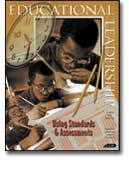Every morning on my way to school, I pass by the marquee of a major entertainment complex. As I sit at the traffic light and patiently wait to begin my day, I glance at the marquee to watch announcements of upcoming events crawl across the screen in bright orange letters. I contemplate the enormity of the organization and the various set-up procedures each event must entail. Sportsmen, antique collectors, outdoor enthusiasts, cat fanciers—there seems to be something for everyone.
Soon, however, my thoughts become focused on the day ahead, and I wonder about the special events that dominate my date book and lesson planner. With increasing frequency, assessments are now the focus of my students' lives. When I glance at my calendar, I hardly ever see a week when I am not either preparing to test or formally assessing my students. This is a significant change since I began my teaching career nearly 20 years ago. I question the usefulness and the implications of the data we gather, as well as the effect these tests have on my teaching and on my students' learning.
Teachers assess students by using an ever-increasing variety of tools. In my district, the average 3rd grader is evaluated with the following instruments: a national norm-referenced test for school achievement, a test to determine school ability, and two state-mandated tests in reading and math. In addition, classroom teachers are required to conduct a writing assessment and a test for oral retelling of a narrative or a descriptive text. Of course, graduation standards are now incorporated into our curriculum, and the 3rd grade in particular has an inordinate amount of developmental standards to assess. Just like the different events held at the entertainment complex, a different assessment tool exists for everyone.
On some days, I merely facilitate movement among tests rather than encourage and enhance student learning. Being a teacher has been reduced to something akin to being the special events coordinator at the entertainment complex. Each test becomes another situation in which I must rearrange the classroom and its routines, coordinate test materials, and work to assuage the fears of the 8- and 9-year-olds whom I teach. The students sense underlying anxiety and apprehension despite assurances from me and their parents that we just want them to do their best.
Ironically, all this activity prepares them for hours of passivity. This extended amount of seat time flies in the face of what we know about how children learn. Unfortunately, it does not seem to matter. It is, after all, the Information Age. The quest for more information drives us forward.
Ostensibly, this test data will enable us to be better teachers, and it will give parents and the public a better idea of whether we are adequately preparing children for a place in society. In reality, however, the information overwhelms everyone. We now have more statistics on children than ever. Teachers are inundated with report after report, analysis after analysis, detail piled upon excruciating detail. Parents receive less information with even less interpretation of the results and, more important, no direct link to what they can do at home to help their child. The public often receives the most dramatic data taken out of context, misinterpreted, or sensationalized.
Teachers are not provided enough time to analyze the test data and to translate the information into meaningful goals for their students. At times we seem to be putting the cart before the horse: Shouldn't we change the way we teach and then assess students? It doesn't make a lot of sense to continue to assess students when we are not given the time to modify our methodology. Without ample time to reflect and change, aren't we simply assessing either old practices or underfunded, undervalued, half-hearted attempts at educational change?
Teachers must have the time to modify and adjust their instructional practices and methods. Some studies indicate that teachers need 40 or more hours of retraining to change the way they teach any one subject. Yet legislators only grudgingly acknowledge staff development as an essential component of teacher education and education reform. Without the time to examine our teaching practices and to work with our colleagues, we will continue to teach in the ways we were taught 20 or more years ago.
In the rush to reform education, the classroom teacher's expertise and common sense have been pushed aside by individuals and groups removed from the reality of the classroom. As professionals with extensive knowledge of child development and learning, we can determine what is best for our students. That does not mean that we will not listen to or accept information from others. It does mean, however, that we will know how to implement the most effective way to enhance student learning.
After all, isn't that the goal of everyone?
